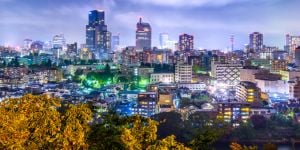
Have you always dreamed of studying in the Land of the Rising Sun? Japan is attracting more and more international students. Although the Covid pandemic has affected visa issuance significantly, the recovery is there. Since March 2022, international students have again been allowed to study in Japan. Here is a guide on how to apply, admission procedures, available courses, and how to get a scholarship.
Since March 2022, when restrictions were relaxed, the number of new international students in non-regular courses at universities, junior colleges, graduate schools, and Japanese language educational institutions has increased again.
According to a survey conducted by the Japan Student Services Organization (JASSO), the number of international students enrolled in Japan as of May 1, 2022, is 231,146. This includes students who had completed the necessary admissi
Benefits of studying in Japan
Japan's more than 400 inhabited islands provide a warm and inviting atmosphere for students to explore and learn. The country values safety, affordability, and friendliness, making it the perfect destination for students seeking both education and adventure.
Thanks to its blend of ancient traditions and modern technological advancements, studying in Japan will allow you to be fully immersed in a unique culture steeped in history while also being at the forefront of innovation. It is one of the best ways to discover the country from the inside. As a tourist, you won't have the time to experience it fully. The duration of the stay will be too short to live in the rhythm of the seasons, experience the daily rush of Japanese public transportation, discover the Japanese educational system, and live like a local.
In addition, the Japanese government recognizes the significance of attracting international students and has prioritized it. Japan's higher education system strongly emphasizes personal growth, ensuring students have more opportunities to gain new skills and knowledge.
When choosing a destination within Japan, popular choices among students include vibrant cities like Tokyo, Osaka, and Kyoto, where some of the best universities in Japan are located, such as the University of Tokyo, Kyoto University, or Osaka University. Obtaining a qualification from one of these prestigious Japanese institutions provides great job opportunities and is a valuable asset for future career aspirations.
Studying in Japan will also give you an idea about long-term immigration, for example, if you want to build your career in Japan. Whether you choose Tokyo – the capital, Kyoto, Osaka, Fukuoka, or other cities, the change of scenery will be all part of your experience.
Types of visas needed to study in Japan
To study in Japan, you must have a proper visa, which varies based on the duration of your studies and nationality. If you plan to study for 3 months or less, you can use a regular tourist visa unless you are from a country or region that does not require a visa to enter Japan. With these types of visas, you cannot enroll in degree programs in universities, but some Japanese language schools offer one- to three-month courses to learn Japanese.
If you plan to study in Japan for over 3 months, you must obtain a student visa. Once a university has accepted you, the institution will apply for a COE (Certificate of Eligibility) on your behalf from the Japanese Ministry of Justice. This document is valid for only 3 months from the date of issue, so it is essential to visit the Japanese embassy or consulate in your country in person to apply for a student visa after receiving it.
Generally, you will need the following documents to apply for a student visa in Japan:
- A valid passport;
- A photo (taken within the last 6 months);
- A completed visa application form;
- The original or a photocopy of the COE issued by your institution.
Additional documents may be necessary depending on your nationality, so be sure to check the Embassy or Consulate of Japan website in your area for more information.
You can also attend school in Japan with a work visa, a spouse visa, or a dependent visa because studying is not considered a paid activity. However, if you hold a work visa, you are not allowed to leave your job solely for the purpose of studying.
Upon your arrival at a Japanese airport, you will be required to have your fingerprints and photograph taken in order to receive a Resident Card (在留カード / zairyu kado). This resident card is specifically for those who stay in the country for over 3 months.
Educational system in Japan
If you move to Japan with your family, it is crucial to consider your children's education.
In Japan, there are different types of educational institutions, including early childhood education and care centers (ECEC), kindergartens, elementary schools, lower secondary schools, compulsory education schools, upper secondary schools, and schools for special needs education. Additionally, there are higher education institutions such as universities, junior colleges, colleges of technology, and specialized training colleges.
Preschool education in Japan
In Japan, preschools consist of ECEC centers (day nurseries) and kindergartens, which provide care and education for children aged 0 to 5.
ECEC centers cater to children aged 0 to 5 and combine the functions and features of kindergartens and nursery centers. They also offer child-rearing support services to local communities, including regular childcare, infant daycare, extended-hour daycare, nighttime childcare, and more.
Applying to a daycare center and preschool in Japan is highly competitive. It is advisable to apply not only to your preferred daycare center but also to alternative options. This way, even if the first choice fails, you will have a backup plan to ensure your children are accepted elsewhere.
Kindergartens offer courses for children aged 3, 4, and 5. These courses, which last from 1 to 3 years, focus on nurturing preschool children's mental and physical development.
Primary education in Japan
Elementary schools cater to children aged 6 to 12, offering primary education that aligns with their mental and physical growth. This education spans 6 years, from grade 1 to grade 6, and focuses on providing a comprehensive foundation.
Secondary education in Japan
In Japan, secondary education consists of lower secondary schools, upper secondary schools, and secondary education schools.
Lower secondary schools cater to children aged 12 to 15. They offer a three-year program from grades 7 to 9, providing a general secondary education that aligns with their mental and physical development. This education builds upon what they learned in elementary school.
Upper secondary schools are available for students who have completed 9 years of compulsory education in elementary and lower secondary schools. To enter upper secondary school, students usually need to take entrance examinations.
These schools' teaching content comprises general, specialized, and integrated courses. General courses are suitable for both students who want to pursue higher education and those who plan to enter the workforce without a specific vocational area in mind.
Specialized courses provide vocational or specialized education for students who have chosen a particular career path. These specialized courses can be divided into various categories: agriculture, art, commerce, English language, fishery, home economics, industry, music, nursing, physical education, science-mathematics, and other subjects.
Secondary education schools offer a combination of lower and upper secondary school education for a total of 6 years. The first 3 years focus on lower secondary school education, while the latter 3 years provide upper secondary school education, including both general and specialized subjects.
Higher education in Japan
In Japan, higher education starts after 12 years of formal education, including 6 years of elementary school, 3 years of junior high school, and 3 years of high school. If you have less than 12 years of formal education, you must complete a one- or two-year university preparatory course before entering higher education.
Higher education institutions in Japan include universities that offer bachelor's, master's, doctor's, and professional degrees. There are also junior colleges that award associate's degrees, colleges of technology that provide practical and creative education for 5 years, and specialized training colleges that offer courses to develop professional or practical skills and foster culture.
Enrolling in a language school in Japan
Currently, all international students need a visa to move to Japan and study Japanese. Start by contacting the school that you are applying to, as they are responsible for providing you with all the information relevant to your admission. The school will act as your sponsor and will connect with the immigration authorities. The immigration authorities will send the CoE (Certificate of Eligibility) to your school, which will forward it to you. You can then apply for a visa.
The procedure is long (about 6 months), and the processing can be extended due to the current context. Make sure you know when you want to start the school year. Schools usually have semesters or seasons (spring, summer, winter).
International students can start by studying Japanese in a school and then continue their training at a Japanese university. Note that the university year in Japan starts in April.
Preparing to enroll in a Japanese university
Admission to a Japanese university requires an exam, and most language schools offer preparatory courses and special JLPT (Japanese Language Proficiency Test) courses. In fact, faculties often require a level of Japanese N2 (advanced intermediate level) to be sure that the student can follow the curriculum in Japanese.
If you are considering a school and faculty program, you should choose a school with a business-oriented curriculum, which includes preparation for the university entrance exams. However, there is no official exam prior to enrolling in a Japanese language institute. In practice, each structure conducts an entrance exam to determine the level of each student. The exam can be taken online before arriving in Japan or on-site on the first day of school.
Applying to a Japanese language school through an agency
If you need guidance or advice, you can seek help from an agency that will take care of the process from start to finish. They can even continue to advise you once you are in Japan. Motivist Japan is one such agency providing free advice to students. The staff of Motivist Japan speaks French, English, and Japanese, among other languages. The agency gets paid when you choose to study with a partner school.
Selected language schools in Japan
Motivist Japan's partners include ARC Academy, which prepares students for the JPLT, and the EJU (Examination for Japanese University), a compulsory exam for entry into a Japanese university. Waseda Edu Language School prepares for the EJU. Some schools are only present in Tokyo. Others, like ARC Academy, ISI (International Study Institute), or Genki JACS (Japanese and Culture School), are present in different cities. ARC Academy is located in Tokyo (2 schools), Osaka and Kyoto. ISI has three schools in Tokyo, Kyoto, and Nagano. Genki is present in Tokyo, Kyoto, Nagoya, and Fukuoka.
To combine learning and cultural discovery, why not choose a school close to nature? Located in Yokowari, Shizuoka Prefecture, Mount Fuji Japanese Language School is, as its name suggests, a language school that is located near the famous Mount Fuji, one of the symbols of the country.
Good to know:
Japanese language schools are expensive. On average, expect to pay between 690,000 and 900,000 yen per year.
Taking the EJU in Japan
To be admitted to a Japanese university, you must first pass an entrance exam. This is known as the EJU, the Examination for Japanese University admission for international students. The EJU verifies the student's ability to attend an undergraduate or graduate school. However, the EJU does not prevent the university from conducting its own entrance exam.
How to take the EJU, quick guide
The EJU focuses mainly on Japanese culture, the Japanese language, science, and mathematics. The exam can be taken in English or Japanese (some websites only offer it in Japanese). The exam is held twice a year, in November and June.
In addition to Japan, the EJi is available in 14 other countries: India, Indonesia, Malaysia, Mongolia, Myanmar, Philippines, South Korea, Russia, Singapore, Taiwan, Thailand, Vietnam, Sri Lanka, and Hong Kong. This means that you must be in Japan or another Asian country mentioned to take the exam.
The EJU costs 7,500 yen for one subject and 14,204 yen for two or three subjects.
Taking the JLPT
The JLPT (Japanese language proficiency test) is not mandatory for enrolling in a university, but it is always helpful to have it, especially if you have a good level. It is a plus point for students. While it is not mandatory for studying in Japan, the JLPT can be required by companies (level 2, advanced intermediate, or level 1, bilingual), so this is another reason why you should consider taking the test.
The different levels of the JLPT
There are five levels of JLPT:
- N4 and N5: beginner, beginner level of listening comprehension;
- N3: low intermediate level of listening comprehension;
- N2: intermediate level of oral comprehension;
- N1: advanced listening level, bilingual.
The JLPT is an MCQ (Multiple Choice Questions) exam, as it is done in the Japanese educational system. There is no oral but a listening comprehension test in the form of MCQs. However, the limitations of the JLPT have been criticized by many as it does not allow for judging the reading and speaking levels of the candidates.
Where to take the JLPT?
For companies, the JLPT is used to prove that the candidate has a good understanding of the Japanese language. It proves that you have a sufficient level of Japanese to join the Japanese labor market. Unlike the EJU, the JLPT can be taken in many countries worldwide: France, Germany, Belgium, Finland, Ukraine, Slovenia, Turkey, Iran, Saudi Arabia, Morocco, Algeria, Sudan, Democratic Republic of Congo, Kenya, Ghana, South Korea, China, etc.
How to enroll in a Japanese university
The procedure for enrolling in a Japanese university is now the same as enrolling in a Japanese language school (except for the EJU). International students must be sponsored by their university to obtain the Certificate of Eligibility (CoE), which is an essential document to apply for a visa.
Is it necessary to go through a language school before applying to a university in Japan?
It all depends on your language skills and your needs. If you have a JLPT N2, you don't need to join a language school in Japan. If you are starting from scratch, be prepared to spend at least 1 year in Japan to acquire the level required for the EJU, so make the most out of your stay in Japan to take the JLPT. Tokyo and the other cities that organize the exam offer two sessions (July and December), compared to other countries.
Regardless of your starting level, take the time to consider all the details of living in Japan as a student. You will also need to cater to your needs during your stay as an international student in Japan. If you choose to work in Japan, you are limited to 28 hours per week. Some international students choose to come to Japan to learn the language in an accelerated way (within 1 year) before enrolling in college. Others prefer to save money by learning the language at home before looking for universities in Japan.
Why learn Japanese when the university offers programs in English?
Most major universities in Japan offer modules in English. The EJU can be conducted in English too, but you must keep in mind the context in which you are studying. Coming to study in Japan to take only English courses does not favor complete immersion (unless you have come for a few months only), but if you plan to stay longer, it is better to learn to speak and read Japanese.
University fees in Japan
Studying in Japan can be expensive. Many variables contribute to the high education costs, like the institution's reputation, its public or private status, the location, the variety of programs offered, and the presence of a university campus, amongst others.
Studying at a national university will cost around 820,000 yen per year. Fees can go up to about 1,000,000 yen for a private university and as high as 3,200,000 yen for an undergraduate degree at a private university in medicine, pharmacology or dentistry.
How do I get a scholarship to study in Japan?
There are scholarship options, tuition waivers, and government-sponsored programs for international students in Japan. For more information, contact your Embassy. If you are attending a university that is partnered with a Japanese institution, check with them as well. You may be entitled to assistance as part of an academic exchange.
Can international students work in Japan with a student visa?
In principle, the student visa does not allow anyone to work in Japan. When applying for a student visa, your school will issue you an authorization to work. You must present it to the immigration services on your arrival in Japan (at the airport). The agents will stamp your passport to indicate that you can work.
As mentioned above, you are allowed to work for a maximum of 28 hours per week. However, the nightlife sector is forbidden to international students.
More tips for international students in Japan
Studying in Japan is a rich experience. Whether you choose Tokyo, the capital, or another city, you will discover unique landscapes, new activities, and a different way of life. Take the time to research universities. Proper planning is essential for a successful project.
If possible, come to Japan a few weeks before joining the university. Get the most out of this period to settle the administrative formalities and discover your new environment.
Ask questions and for information. Do not go by misconceptions. seek help if you have any difficulties. Studying is not easy and can be even more stressful when you are abroad. Do your best to master the basics of Japanese before coming to Japan.
Useful links:
Ministry of Foreign Affairs of Japan – Student Visa
JASSO - Japan Student Services Organization
List of countries in which the JLPT can be taken
We do our best to provide accurate and up to date information. However, if you have noticed any inaccuracies in this article, please let us know in the comments section below.








